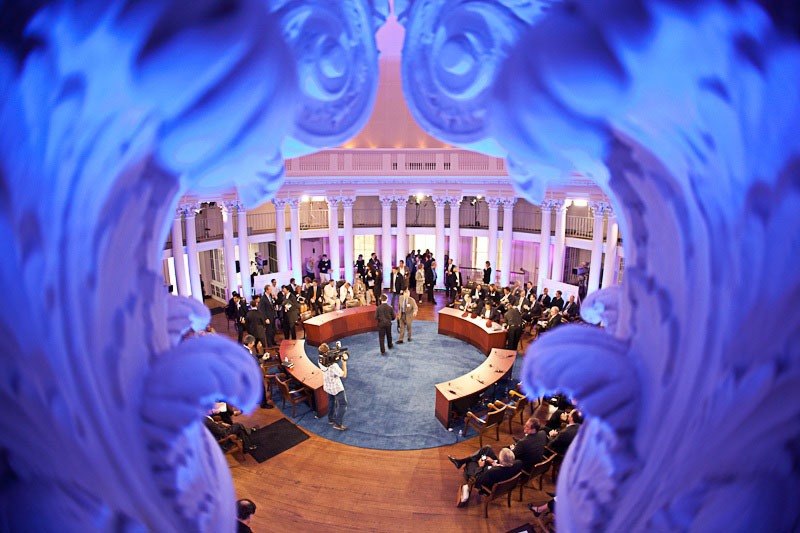October 12, 2011 — More than 60 leaders from business, government, academia, media and the arts convened at the University of Virginia on Tuesday and Wednesday for the Jefferson Innovation Summit, a gathering to spur a constructive conversation on how to create and sustain entrepreneurship and innovation in the United States.
"The summit is an 'un-conference,'" said Sean D. Carr of the Darden School's Batten Institute for Entrepreneurship and Innovation, which organized the event. "There are no keynote speakers, no panels – just conversation."
The event kicked off with a role-playing session, similar to a business school case study discussion, featuring 13 of the summit's delegates. Held in the Dome Room of the Rotunda, the session was moderated by Tyler Mathisen, co-anchor of CNBC's "Power Lunch," and was simulcast on CNBC.
Mathisen played the role of "Alex," a hypothetical engineering student who wants to start a business with his potentially breakthrough product: a house paint that collects solar energy. Summit delegates, who had not been briefed on the scenario, played business students and professors looking to partner with Alex, university administrators, venture capitalists, representatives from all levels of government, regulators and corporate executives.
In working through the decisions Alex and his fellow entrepreneurs face, the delegates explored many of the obstacles to entrepreneurship and innovation in the United States.
Education emerged as a key concern. "We're resisting change at the most basic level," said Peter Kiernan, CEO of Kiernan Ventures. Particular challenges include teaching students to think broadly and creatively and attracting students at all grade levels to the so-called STEM subject areas of science, technology, engineering and math.
"We have to make it cool to do these things," said John Abele, co-founder of Boston Scientific.
Fred Friendly Seminars, a nonprofit organization that creates "relevant, spontaneous and compelling" conversations through Socratic dialogues, developed the role-playing session.
After a working dinner at Monticello, delegates reconvened Wednesday morning for a session at Montalto, during which they participated in a small-group exercise to generate ideas related to broad areas of opportunity and concern for entrepreneurship and innovation in the United States: education, financing, regulation, culture, intellectual property, tax policy and immigration.
The idea-generation exercise, which Darden professors have employed in the classroom, draws upon techniques long used by designers. In the exercise, participants jot down ideas on Post-it Notes, cluster the ideas into themes, and then tease out broad principles and issues. Delegates were instructed to focus not on constraints and obstacles, but on possibilities.
In the coming weeks, the group plans to incorporate the ideas and issues raised during the summit in a statement of principles, a "Declaration of Innovation" that can guide national efforts to create an environment in which entrepreneurship and innovation can flourish.
The summit also spotlighted several local entrepreneurs, who spoke of their experiences and Charlottesville's entrepreneurial community in a public event following the screening of "Something Ventured," a documentary about the rise of the venture capital industry in the 1960s and 1970s.
"The summit is an 'un-conference,'" said Sean D. Carr of the Darden School's Batten Institute for Entrepreneurship and Innovation, which organized the event. "There are no keynote speakers, no panels – just conversation."
The event kicked off with a role-playing session, similar to a business school case study discussion, featuring 13 of the summit's delegates. Held in the Dome Room of the Rotunda, the session was moderated by Tyler Mathisen, co-anchor of CNBC's "Power Lunch," and was simulcast on CNBC.
Mathisen played the role of "Alex," a hypothetical engineering student who wants to start a business with his potentially breakthrough product: a house paint that collects solar energy. Summit delegates, who had not been briefed on the scenario, played business students and professors looking to partner with Alex, university administrators, venture capitalists, representatives from all levels of government, regulators and corporate executives.
In working through the decisions Alex and his fellow entrepreneurs face, the delegates explored many of the obstacles to entrepreneurship and innovation in the United States.
Education emerged as a key concern. "We're resisting change at the most basic level," said Peter Kiernan, CEO of Kiernan Ventures. Particular challenges include teaching students to think broadly and creatively and attracting students at all grade levels to the so-called STEM subject areas of science, technology, engineering and math.
"We have to make it cool to do these things," said John Abele, co-founder of Boston Scientific.
Fred Friendly Seminars, a nonprofit organization that creates "relevant, spontaneous and compelling" conversations through Socratic dialogues, developed the role-playing session.
After a working dinner at Monticello, delegates reconvened Wednesday morning for a session at Montalto, during which they participated in a small-group exercise to generate ideas related to broad areas of opportunity and concern for entrepreneurship and innovation in the United States: education, financing, regulation, culture, intellectual property, tax policy and immigration.
The idea-generation exercise, which Darden professors have employed in the classroom, draws upon techniques long used by designers. In the exercise, participants jot down ideas on Post-it Notes, cluster the ideas into themes, and then tease out broad principles and issues. Delegates were instructed to focus not on constraints and obstacles, but on possibilities.
In the coming weeks, the group plans to incorporate the ideas and issues raised during the summit in a statement of principles, a "Declaration of Innovation" that can guide national efforts to create an environment in which entrepreneurship and innovation can flourish.
The summit also spotlighted several local entrepreneurs, who spoke of their experiences and Charlottesville's entrepreneurial community in a public event following the screening of "Something Ventured," a documentary about the rise of the venture capital industry in the 1960s and 1970s.
— By Amy Halliday
Media Contact
Article Information
October 12, 2011
/content/un-conference-examines-ways-spur-entrepreneurship

